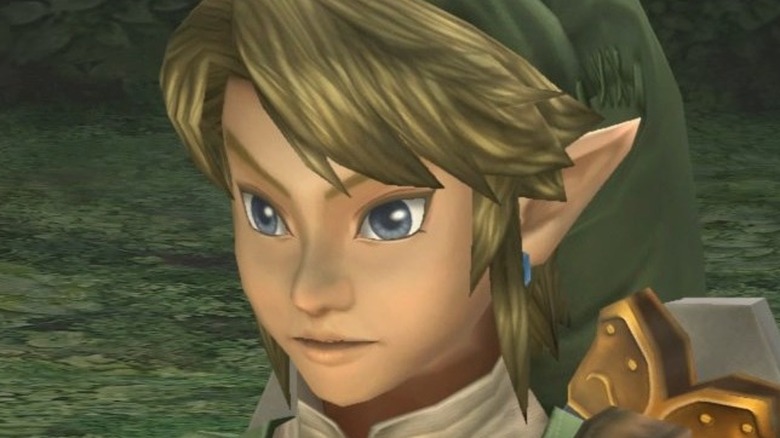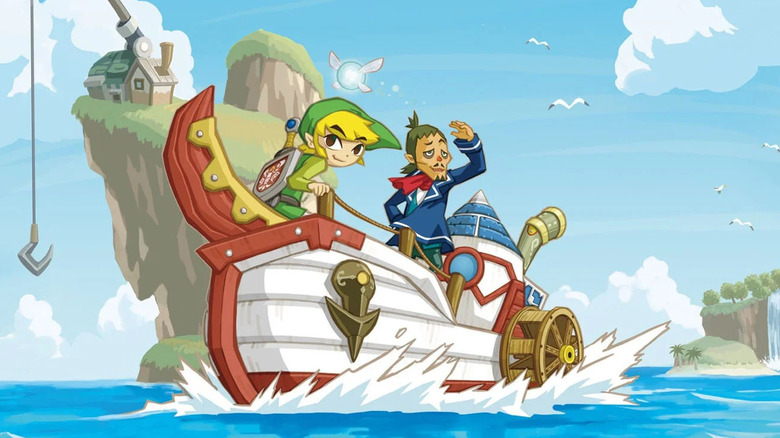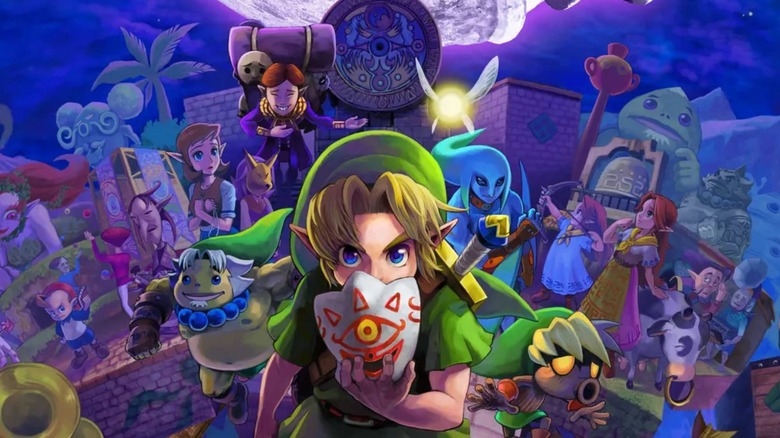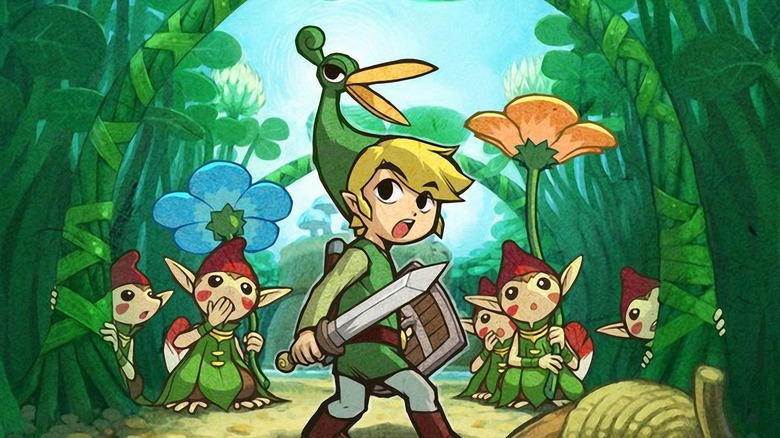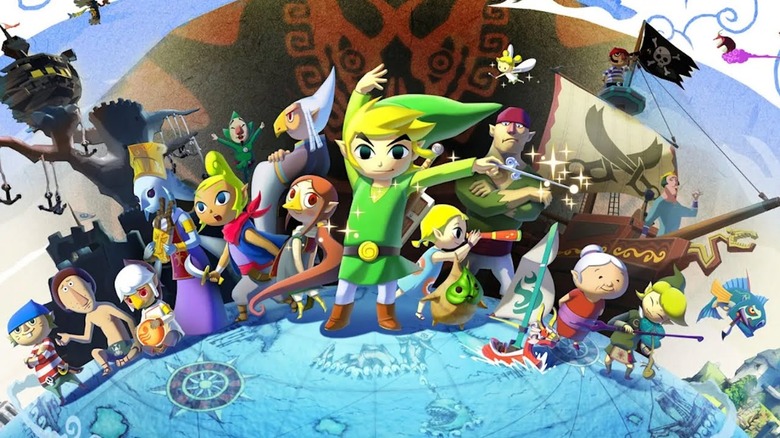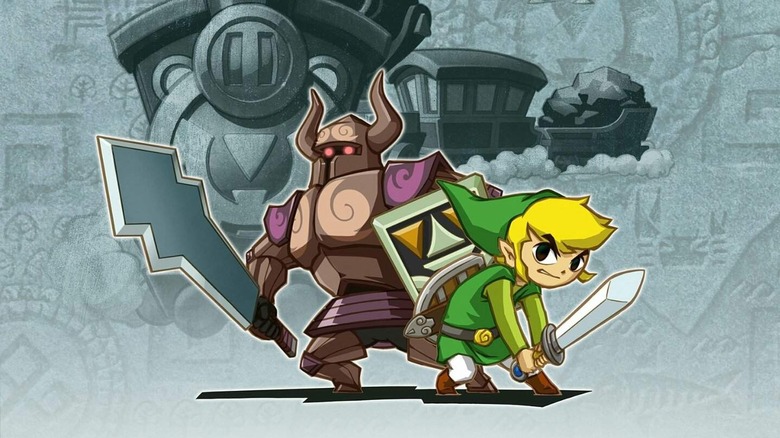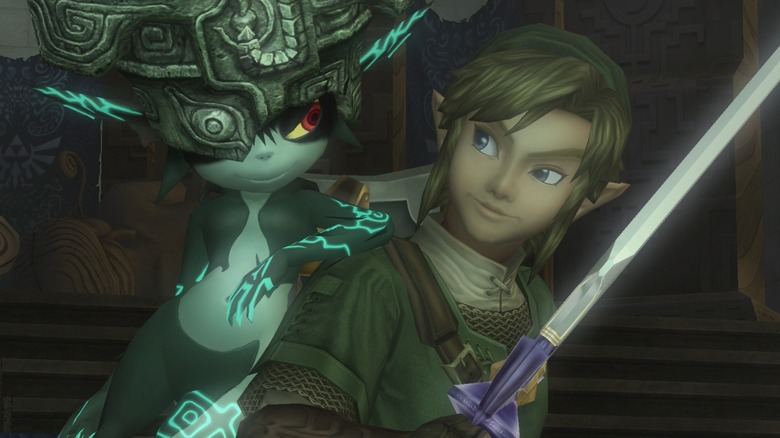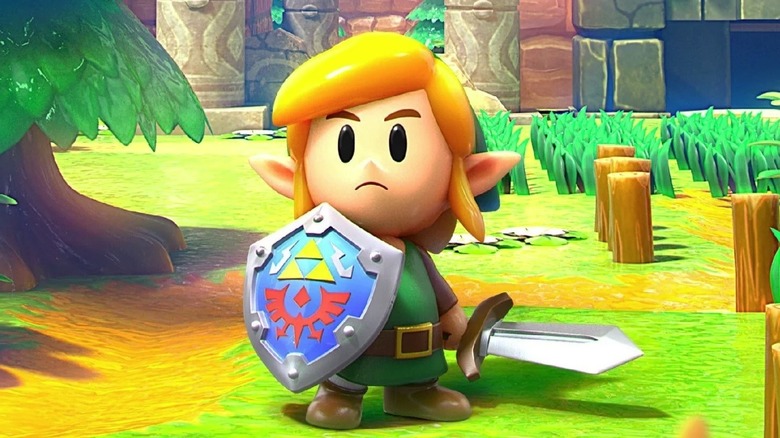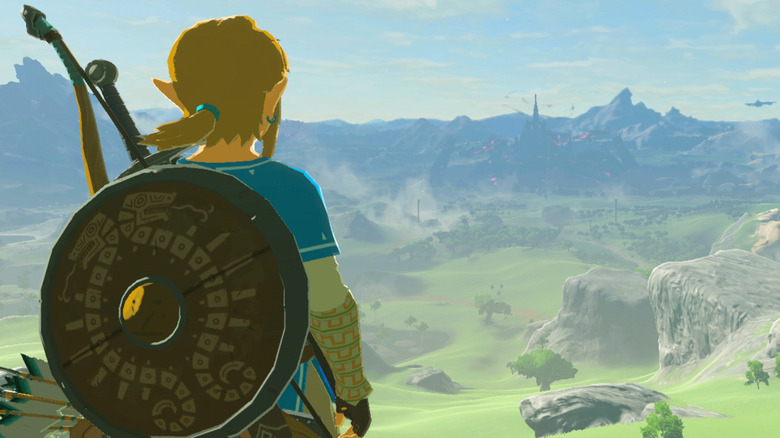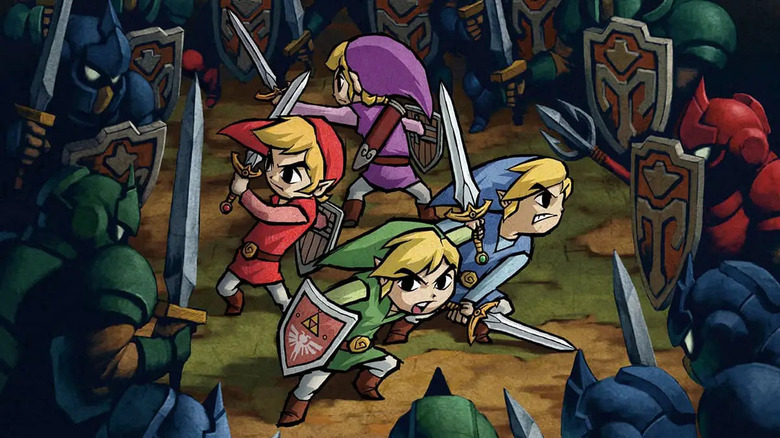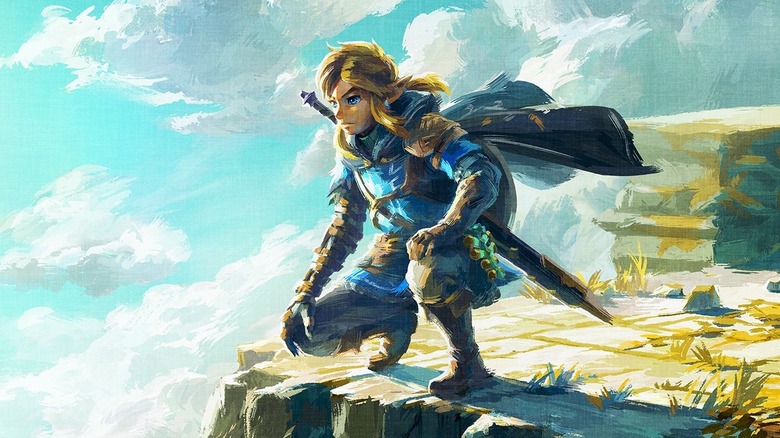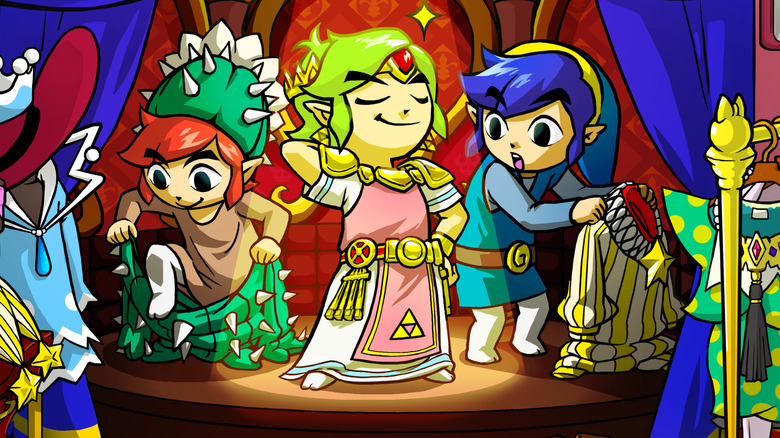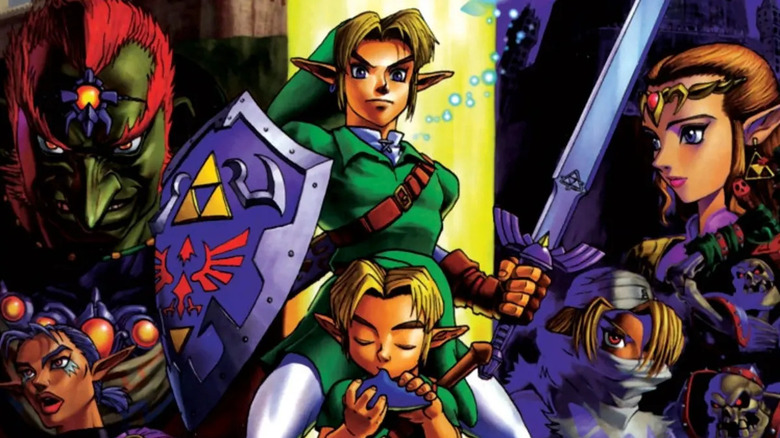The 6 Best And 6 Worst Zelda Games, According To Metacritic
As a child, "The Legend of Zelda" creator Shigeru Miyamoto wandered the areas around his home in rural Japan. The environments ranged from rice paddies to hills, and each offered its own type of adventure. In elementary school, a hiking trip brought him to a breathtaking mountain with an impressive view. Though he could not have known it at the time, this seemingly simple moment later shaped one of the most influential video game franchises ever made.
"I was so amazed — it was the first time I had ever experienced hiking up this mountain and seeing this big lake at the top," Miyamoto shared with NPR. "I drew on that inspiration when we were working on 'The Legend of Zelda' game and we were creating this grand outdoor adventure where you go through these narrowed confined spaces and come upon this great lake."
This sense of wonder and exploration came to define the "Zelda" series. Though it has experienced its share of peaks and valleys over the years, few IPs can rival its impressive track record of hits. Even its less-polished entries still have a lot to offer players. But which "Zelda" games provide the best experience and which could have used a little more time in development? Metacritic's scores may provide an answer. Here's a look at the best and worst "Zelda" titles according to the review aggregator. Note: This list does not include remasters, ports, or titles such as "The Adventure of Link" that lack a Metacritic score.
Worst: Phantom Hourglass
"Phantom Hourglass" continues the story established in "The Wind Waker," focusing on the first of Link and Tetra's (no doubt numerous) misadventures after foiling Ganondorf's ambitions. The seafaring excursion includes a ghost ship, the promise of treasure, and a slew of the characteristic "Zelda" McGuffins to collect. Unfortunately, it also shelves Tetra, one of the best versions of Princess Zelda, early in the narrative, resulting in some wasted potential from the get-go.
Despite making such a questionable story choice, "Phantom Hourglass" has a lot going for it. Many critics consider it one of the best (if not the best) games to ever release for the Nintendo DS, in part thanks to how well the gameplay blends with the handheld's design features. Not too easy or difficult, it also manages to hit the sweet spot for both casual players and those looking for more of a challenge. It lost some points for its rather short campaign, limited exploration, and lack of replayability. While still a great game that boasts many of the best-loved tropes of the series, these drawbacks pushed it toward the bottom of Metacritic's "Zelda" rankings.
-
Release Date: October 1, 2007
-
Platforms: Nintendo DS
Advertisement -
Genre: Action-adventure
-
Game Modes: Single-player, multiplayer (up to 2)
-
Metacritic Score: 90 (DS)
Best: Majora's Mask
As a direct sequel to "Ocarina of Time," "Majora's Mask" had some big shoes to fill. The first chronological title in the Child Era branch of the "Zelda" timeline, the installment follows Link after his return to his youthful form at the close of the previous game. After preemptively saving Hyrule from Ganondorf, he sets off in search of his one remaining friend, the fairy Navi. Along the way, he runs afoul of Skull Kid and ends up trapped in a three-day time loop in a parallel version of Hyrule speeding toward an apocalypse.
Critics praised nearly every aspect of "Majora's Mask," paying special attention to its graphics, surprising and thought-provoking story, and darker tone. The entry also includes one of the best representations of Link, painting him as a top-tier hero and tragic figure haunted by his past. The sequel retains many of the elements that made its predecessor popular while providing a treasure trove of masks and transformations to play with across different situations. Though the time loop mechanic and emphasis on side quests turned off some players, "Majora's Mask" proved to be an overall success. It even received a remake for the 3DS in 2015.
-
Release Date: October 26, 2000
-
Platforms: Nintendo 64
Advertisement -
Genre: Action-adventure
-
Game Modes: Single-player
-
Metacritic Score: 95 (N64)
Worst: The Minish Cap
"The Minish Cap" stands out as one of a handful of "Zelda" entries that Nintendo did not directly develop. Capcom and Flagship took the reigns for the project after the latter completed its work on "Oracle of Seasons" and "Oracle of Ages." Capcom had previously worked with Nintendo EAD on "Four Swords," with "Minish Cap" serving as a prequel for that game. It establishes the origin story of the artifact known as the Four Sword and the sorcerer Vaati, who functions as the antagonist of both installments.
Like many of the other "Zelda" games created for the handheld market, "The Minish Cap" didn't quite live up to the legacy of the franchise. Reviewers praised it as one of the best titles for the Game Boy Advance thanks to the music, dungeon design, and fresh cast of characters. They also highlighted its gameplay innovations, including its novel core mechanic, which involves Link donning a magical hat to shrink down to a much smaller size.
Despite its strong points, "The Minish Cap" has a few faults that have kept it from reaching the same heights as other series offerings. Reviewers found the puzzles and lack of real challenge or innovation particularly frustrating, but it remains a serviceable "Zelda" outing for anyone looking for more of the same experience.
-
Release Date: January 10, 2005
-
Platforms: Game Boy Advance
-
Genre: Action-adventure
-
Game Modes: Single-player
-
Metacritic Score: 89 (GBA)
Best: The Wind Waker
As soon as gamers booted up "The Wind Waker," they could tell that it went in a different direction than what came before it. Instead of exploring the vast lands of Hyrule, the action unfolds on the open sea and across various islands. Rather than a lone villager or swordsman, Link has a sister this time (who immediately gets kidnapped, surprise surprise). Even Zelda (though players don't discover her true identity until later) traded in her gowns and throne for pants and a pirate ship. Of course, there's also the much more cartoonish art style.
Though the art direction proved offputting for many fans and resulted in slower sales, critics still loved "The Wind Waker." The controls, gameplay, puzzles, and sound design all dazzled reviewers. The title also got high marks for its replayability, made all the more enjoyable by the player's freedom to explore the different environments. Further, many felt the art style actually added to the experience, as it allowed the developers to convey much more expressive characters. In turn, this led to heightened emotional connections that strengthened the narrative. All of this combined to cement "The Wind Waker" as one of the greatest "Zelda" titles in existence.
-
Release Date: March 24, 2003
-
Platforms: Nintendo GameCube
Advertisement -
Genre: Action-adventure
-
Game Modes: Single-player
-
Metacritic Score: 96 (GameCube)
Worst: Spirit Tracks
Those following along may have noticed a trend: The "Zelda" games released for Nintendo's purely handheld consoles just don't seem to get as much love as the other installments. This proved the case for "Spirit Tracks," which came to the Nintendo DS in 2009. A follow-up to "The Wind Waker" and "Phantom Hourglass" set a hundred years later, the game centers on new iterations of Link and Zelda. Link has embarked on a path to become a train engineer, which comes in handy for getting around the landscape. Zelda also gets to join him on the adventure, albeit in spirit form, allowing her to play a key role in the gameplay.
Critics generally saw "Spirit Tracks" as another win for portable gaming. It contains the franchise's hallmarks, while also delivering some new mechanics to keep the formula from growing too stale. Many reviewers highlighted the quality of the puzzles and dungeons and thought it was a perfect release for the holiday season. However, the pacing, on-rails narrative, and overwhelming similarities to "Phantom Hourglass" left something to be desired. Though not a bad game by any means, it also doesn't stand out in the sea of hits that is "The Legend of Zelda."
-
Release Date: December 7, 2009
-
Platforms: Nintendo DS
-
Genre: Action-adventure
-
Game Modes: Single-player, multiplayer (up to 4)
-
Metacritic Score: 87 (DS)
Advertisement
Best: Twilight Princess
After the art direction in "The Wind Waker" divided players, Nintendo returned to the franchise's more realistic style for "Twilight Princess." Offering up a darker storyline, the title sees Hyrule invaded by a sorcerer from another dimension. This usurper unleashes a perpetual twilight on the land, turning most of Hyrule's inhabitants into spirits. Link undergoes his own transformation into a wolf and gains the series' best companion, Midna, as he sets out to free his home. Over the course of the game, he grows from a youthful ranch worker into a courageous and skilled fighter, making this one of the character's most memorable outings.
"Twilight Princess" received a dual release for the Wii and GameCube and critics loved it on both systems. The more character-driven story stole the show, augmented by the gloomy tone. Well-crafted dungeons, side quests, and locations also helped the game stand out, providing players with a setup that feels both familiar and occasionally surprising. It honors the titles that came before it while adding bits of novelty, such as Link's ability to become a wolf, letting him interact with the environments in new ways. Add in dozens of hours of gameplay on top of that, and it's clear that the launch of "Twilight Princess" marked a high point for the franchise.
Worst: Link's Awakening Remake
26 years after "Link's Awakening" debuted on the Game Boy, it made the leap to the Switch with a full remake. Another "Zelda" title not developed by Nintendo, the remake stands out due to its art design, which gives the characters a toy-like quality. Though it tells the same story as the original, it also features a few differences, improvements, and additions, such as the ability to acquire dungeon areas that the player can then assemble into custom dungeons.
For the majority of reviewers, the "Link's Awakening" remake breathed new life into a classic, providing a nostalgic and fulfilling walk down memory lane. They felt it fixed the few problems with the original while offering compelling new reasons to play, even for those who had already experienced the adventure. Unfortunately, a host of framerate drops prevented "Link's Awakening Remake" from joining the halls of the "Zelda" legends. Critics also weren't too impressed by its short length and high price tag.
-
Release Date: September 20, 2019
-
Platforms: Nintendo Switch
-
Genre: Action-adventure
-
Game Modes: Single-player
-
Metacritic Score: 87 (Switch)
Best: Breath of the Wild
A launch title for the Nintendo Switch, "Breath of the Wild" also ushered in a new era for the "Zelda" IP. Rather than telling a linear story, the game invites players to explore its open world and complete quests in the order of their choosing – they can even skip ahead to the showdown with its big bad. Set 100 years after an event known as the Great Calamity, "Breath of the Wild" follows a more seasoned version of Link as he attempts to piece together his lost memories. He interacts with a cast of memorable characters along the way, including one of the franchise's most nuanced takes on Princess Zelda.
Critics met the release of "Breath of the Wild" with nigh universal positivity, and it remains one of the benchmarks of open-world game design. Nintendo borrowed mechanics from other parts of the industry and improved upon them, while also introducing features that captivated new and returning players. It raked in multiple perfect scores, with many reviewers naming it the culmination of a multi-decade experiment. While some gamers still don't understand what all the hype is about, the majority of critics saw "Breath of the Wild" as Nintendo's true masterpiece.
Worst: Four Swords Adventures
As the name suggests, "Four Swords Adventures" continues the action of "Four Swords," sending Link and his magical clones on another quest to save Hyrule. Along the way, they must contend with Shadow Link, the hero's iconic evil duplicate. Players can choose to go it alone or journey forth with up to three other people, each controlling their own color-coded Link as they work together to power up the Four Sword.
One of the biggest draws highlighted by reviewers was the accessibility of "Four Swords Adventures." Nintendo made it simple for anyone of any skill level to pick up and play. They felt it shined as a multiplayer adventure, easily drawing people into extended gaming sessions, though it didn't necessarily have enough content to sustain them. Sadly, only individuals with a GameBoy Advance and a link cable can take advantage of the co-op component, which means it requires quite an investment to experience "Four Swords Adventures" at its best. This limited the title's potential and ultimately resulted in disappointing sales for Nintendo.
-
Release Date: June 7, 2004
-
Platforms: Nintendo GameCube
-
Genre: Action-adventure
Advertisement -
Game Modes: Single-player, multiplayer (up to 4)
-
Metacritic Score: 86 (GameCube)
Best: Tears of the Kingdom
For a large number of players, the "Zelda" franchise hit its zenith with the debut of "Breath of the Wild." But it turns out Nintendo still had a few cards to play, a reality that came to light when the sequel hit the scene five years later. "Tears of the Kingdom" continues the narrative of its predecessor, bringing back fan-favorite characters while introducing new notables. Link finds himself separated from Princess Zelda once again as he helps the various people of Hyrule. As part of this journey, he must overcome the latest take on the series' signature threat: the King of Evil himself, Ganondorf.
The perfect scores poured in once more when the "Tears of the Kingdom" launch date arrived. Critics heralded it as the new gold standard for both "Zelda" and the open-world format. It improves on its predecessor in nearly every way while also expanding the setting and mechanics with fresh locations and concepts. It provides an even greater emphasis on exploration and ingenuity thanks to abilities like Ultrahand and Fuse, while the story dishes out enough intrigue to keep players invested. From the perspective of reviewers, "Tears of the Kingdom" represents the bright future still ahead of "The Legend of Zelda."
-
Release Date: May 12, 2023
-
Platforms: Nintendo Switch
-
Genre: Action-adventure
-
Game Modes: Single-player
Advertisement -
Metacritic Score: 96 (Switch)
Worst: Tri Force Heroes
"Tri Force Heroes" is kind of the black sheep of the "Zelda" series. Another multiplayer-optional title made for one of Nintendo's portables, it's the only franchise entry with a score lower than 80 on Metacritic. The game takes place after "A Link Between Worlds" and features the same version of Link. Though considered canon by Nintendo, fans continue to question whether it should exist in the official timeline, in large part thanks to the story's lack of real connection to the overall "Zelda" lore.
The bulk of reviewers managed to find something to enjoy in "Tri Force Heroes," though most agreed that its single-player experience does not feel as fulfilling as playing with friends. It provided a pleasant enough distraction for fans waiting for bigger "Zelda" console releases, with its level design, in particular, standing out. However, a tedious gameplay loop, silly if occasionally charming premise, and lack of real depth make "Tri Force Heroes" the lightest and least satisfying of the "Zelda" fare on offer.
-
Release Date: October 23, 2015
-
Platforms: Nintendo 3DS
-
Genre: Action-adventure
-
Game Modes: Single-player, multiplayer (up to 3)
-
Metacritic Score: 73 (3DS)
Best: Ocarina of Time
Despite many reviewers declaring "Tears of the Kingdom" the series' new magnum opus, the reigning "Zelda" entry has managed to hang on to its crown – at least according to the Metacritic rankings. The only game to have attained a 99 Metacritic rating, "Ocarina of Time" remains an industry-shaking achievement. It pioneered multiple features that have since become the standard for titles within the genre while simultaneously elevating "Zelda" to new heights. From the iconic items to the challenging temples and haunting ocarina melodies, "Ocarina of Time" has long been recognized as a classic and one of the best video games ever made.
Upon its launch in the late '90s, critics predicted that gamers would continue to enjoy "Ocarina of Time" for decades to come. The game fires on all cylinders, serving up a feast of fantastic puzzles, intriguing plot elements, exciting enemies, and captivating characters. The immersive visuals and audio design draw players in, to the point that it can be difficult to let go and return to the real world. Before "Tears of the Kingdom," "Ocarina of Time" was the undisputed blueprint for "Zelda," and its lasting influence can still be felt across multiple series and game systems.
-
Release Date: November 21, 1998
-
Platforms: Nintendo 64
-
Genre: Action-adventure
-
Game Modes: Single-player
-
Metacritic Score: 99 (N64)
Advertisement

